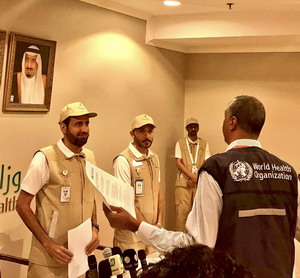 23 August 2018, Makkah – An estimated 2.7 million Muslims from 109 countries have safely concluded the annual hajj pilgrimage in Saudi Arabia’s holy city of Makkah.
23 August 2018, Makkah – An estimated 2.7 million Muslims from 109 countries have safely concluded the annual hajj pilgrimage in Saudi Arabia’s holy city of Makkah.
The hajj is one of largest annual religious mass gatherings in the world, but months of preparedness by the Saudi Ministry of Health meant hajj 2018 (1439 H) was celebrated without major health events.
With technical support from WHO, the Ministry invested in improving readiness, preparedness and response capacities at all levels to prevent and detect potential health threats early on. A comprehensive and integrated plan ensured that visiting pilgrims and citizens and residents of Saudi Arabia stayed safe.
The plan included essential public health mitigation measures to address any potential transmission of emerging infectious diseases such as cholera, Middle East respiratory syndrome (MERS), influenza, meningitis and other infectious diseases, in line with the requirements of the International Health Regulations (IHR 2005).
The Ministry’s preparations for the hajj began well in advance. Health requirements for the pilgrimage were updated and shared with other countries through embassies and WHO’s Regional Offices across the world. A health risk assessment was conducted using a special risk assessment tool for mass gatherings, and 12 designated points of entry (9 land border crossings, 2 airports and 1 seaport) were equipped to receive pilgrims.
Over 30 000 health care workers and allied health service personnel were deployed, with training in the diagnosis and management of heat-related conditions. Saudi Arabia’s online Health Electronic Surveillance Network was expanded to cover all the country’s hospitals and most of its primary health care facilities. The Ministry of Health encouraged pilgrims to get vaccinated against preventable diseases, including seasonal influenza, meningococcal meningitis, polio, yellow fever and other diseases.
Existing health information systems were complemented with a new electronic early warning system for syndromic and event-based surveillance. Developed jointly by the Ministry of Health and the WHO Regional Office, the new system aimed to detect potential health threats that could lead to a disease outbreak or public health emergency, so that the health authorities could implement effective countermeasures. It was piloted in 8 hospitals and 25 primary health care facilities in the holy sites of Makkah, Madinah, Mina, Muzdalafa and Arafa.
The Ministry provided specialized and primary health care services to over 2 million pilgrims. In addition to 25 hospitals, 18 advanced triage centres, 155 primary health centres and 180 ambulances, a field (mobile) hospital visited the holy sites.
The Ministry also implemented effective risk communication and community engagement activities. Key messages on how to prevent sunstroke were disseminated to pilgrims in different languages, and concrete measures were put in place to reduce the impact of heat exhaustion.
According to preliminary surveillance data, no disease outbreak or event of health concern occurred during this year’s hajj. No cases of cholera, MERS or other emerging infectious diseases were reported among pilgrims. Available information shows a 12% decrease in the number of heat exhaustion cases and sunstroke among pilgrims compared with the same period last year, and health services were well prepared and provided timely treatment to those in need. Morbidity and mortality attributed to seasonal influenza were also lower than in previous years.
The WHO Regional Office expresses deep appreciation for the public health preparedness measures implemented by the health authority of the Kingdom of Saudi Arabia to prevent and mitigate any public health threat during this year’s hajj.
Related link
Early warning surveillance system implemented in Saudi Arabia for this year’s hajj
18 August 2018





